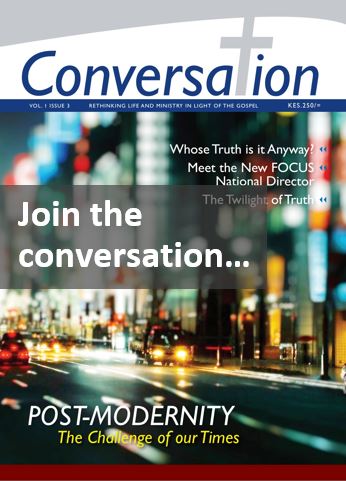A danger was pointed out to me recently that simply being gospel-centred is not enough – for an individual, church or ministry.
Let me try to illustrate with a few diagrams.
- Gospel-centred but gospel-assumed rather than gospel-explicit

With gospel-assumed there is a lot of talk about gospel but we never quite get around to defining and spelling out exactly what we mean by the gospel. So very quickly not only are we not actually preaching the gospel to others (so no-one is being converted or built up), we start to forget it ourselves.
The solution: We go back to the Bible every day to remind ourselves of the good news from all over Scripture. We need to fill in the word with Bible detail.
For example in my Bible reading this morning I saw in 1 Chronicles 11 a little vignette of the gospel – one man standing against a whole army of Philistines ‘and the LORD saved’ (v14). And I see a tiny picture of the One Man who stood instead of us and triumphed over all our enemies – Satan, death, hell. And I’m reminded that the LORD saves – the most succinct summary of the gospel – salvation belongs to the LORD. His is the victory we will praise for all eternity (Rev. 7:10). I did not save myself. I was not one of David’s mighty men, I was more like a faithless Israelite or a hostile Philistine. I didn’t do a thing to move towards God. But he saved me. The Father chose me, the Son took my place on the cross, the Spirit grabbed me and united me to Christ. Sovereign grace grabbed me.
- Gospel-centred but gospel-small rather than gospel-big

With gospel-small there may be explicit regular mention of the gospel but it is a bit formulaic and anemic. I make sure I get into every sermon ‘Jesus died on the cross for us’ but that’s about it. So before long it loses its impact on our hearers or even on our own hearts. It starts to seem like a small thing and (if we’re honest) a rather boring message. So it doesn’t change lives.
The solution: we go back again and again to the Bible – all different parts of the Bible – Psalms, prophecy, letters, stories – to see the richness and depth and vastness and complexity and multi-faceted, multi-coloured beauty of the gospel from the detail of specific Bible texts.
For example in my morning devotion in 1 Chronicles 11 I see David finally acknowledged as king by his people. I see that he is of the same bone and flesh as his people (v1), that he is the shepherd of his people (v2), that he binds himself in covenant to his people (v3). I am reminded by the mention of Uriah the Hittite (v41) that this was not the perfect King. And my eyes are drawn to the Son of God who took bone and flesh that he could be the Second Adam united to his bride and the Second David, Goliath-slaying king over his people, the Good Shepherd who lays down his life for the sheep (John 10:11, 15) and makes incredible promises binding himself to his people (John 10:27-28; 11:25-26; 12:26; 14:3, 23; 15:7-8).
If I had longer I could try to explore the significance of the King winning Jerusalem for his people (1 Chron. 11:4-9), the pattern of taking advantage of something won for you at great cost (1 Chron. 11:15-10 cf. John 6:53), the need for a hero (1 Chron. 11:20-25. And this is all from one chapter. If we keep doing this from text after text we start to build up a rich, beautiful, big heart-capturing gospel picture.
It’s the difference between a little stick man picture and a 6” by 6” Klimt portrait.

- Gospel-centred but floating rather than rooted

Gospel-floating is where we do a decent job of explaining the heart of the gospel but it is not rooted into the rest of the Bible text and systematic theology. The gospel is floating unmoored, unanchored, untethered. This is a subtle danger. We can appear to be ‘just wanting to preach the gospel’ and ‘just wanting to preach Bible’ but by failing to tie the gospel into broader biblical themes and doctrinal structures we can drift off into something less than orthodox and biblical. In times of increasing biblical illiteracy this is going to be a serious issue – we can’t take for granted the doctrine of God, doctrine of creation, doctrine of man.
Solution: We go back to the Bible and seek to do exposition which avoids both the danger of eisegesis (where we pour our systematic framework into every verse – a rather boring and dangerous form of exposition) but also the danger of preaching things from one Scripture that assume or are even deny the truths of other Scriptures. We need to go to the Scriptures with a view that it is one story with a consistent theology that we need to seek to learn as well as we’re able (though humbly accepting that no one of us will never see it perfectly).
For example, 1 Corinthians 15:1-10 – that great gospel summary – is actually leaning on a whole lot of stuff. That’s why it says ‘according to the Scriptures’ twice. The idea of ‘dying for our sins’ only makes sense if you know a) what sin is and b) how it is possible for one to die for sins. To really understand this gospel summary I’m going to need to dig into the Old Testament for a complex biblical understanding of sin, including particularly the fact that it is first and foremost against God and calls down the wrath of God. Then I’m going to need to unpack the sacrificial system and the whole idea of a substitute being burnt up in the wrath of God instead of me. And the same is true of ‘rising on the third day according to the Scriptures.’ I’m going to need to look at what resurrection really means – the end time, the judgment day, the need for this creation to be swallowed up in an imperishable holy new creation. Without a lot of biblical undergirding the language of ‘Christ died for you and rose again’ is almost completely meaningless.
Another example: When I look at 1 Chronicles 11:1 and think through the way in which Christ shared our human nature (bone and flesh) I need to connect it all the way back to Genesis 3:16 and the promise of one born of woman who would crush the serpent. I would also need to look forward to what the New Testament says about the human nature of Christ. I would want to be guided in that by the ancient creeds and historic confessions where the church has thought long and hard and come up with very carefully considered words to express the completeness of Christ’s humanity and the wonder of two natures in one person without confusion or separation. I might also want to think of Athanasius and Irenaeus and the huge importance of the incarnation, God becoming man that we might share in his divine nature. Then I might want to think about the ascension and the importance of Christ retaining his human nature there, right now calling me his brother.
One more example: When we read in the prophets of the LORD’s yearning for his beloved people, his heart being moved, his inmost parts (KJV: bowels) being disturbed (e.g. Jeremiah 31:20) then surely we are seeing the very spring of the gospel – the passionate love of God. I’m definitely going to want to preach that to myself and others. But at the same time I’m going to have to be careful I don’t deny the orthodox definition of God. I’ll want to give full force to the biblical language of affections but also keep respectfully in mind the ancient understanding that God is immutable, ‘without parts or passions’ and the biblical material that says that God is wholly other and ‘not like a man.’ Not to say that all this has to come into a pulpit. Most of it will stay in the study, but if I ignore this theology I run the risk of teaching fluff or heresy.
- Gospel-centred but DIY implications rather than Bible implications

Here we have a good, rich, well-rooted biblical understanding of the gospel, but when it comes to working out the implications of the gospel (for my own life or for church life) then I sort of ‘wing it’ – DIY – Do It Yourself. I assume a) that God is not particularly prescriptive about exactly how I should lead my life or how the church should be ordered and b) I assume that I am able work out for myself, from the internal logic of the gospel, how if should be applied in different areas of life.
For example I see that the gospel springs from the consistent other-person-centred love of God and so I think the implication of the gospel is ‘any stable, loving, other-person-centred relationship’. Or I see that the gospel is the salvation not only of our souls but also of our bodies and indeed the renewing of the whole creation and so I think an implication is that the church’s mission is, with equal emphasis, to a) care for souls and b) to care for people’s bodies, transform society and fight for the natural environment.
I was reading a good Christian book the other day by a fine author who knows and explains the gospel extremely well. Much of the book was excellent. But, as I read one chapter where he described the implications of the gospel for church life, I started to feel something was a little bit off. And then I realised that he hadn’t quoted Scripture for several pages. We were moving into deductions from deductions from deductions – DIY implications.
The solution: We go back to the Bible and find the implications of the gospel from the Bible itself. This is particularly clear in the Apostle Paul’s letters. Most of them (roughly speaking) start with a couple of chapters of gospel doctrine then move to a concluding couple of chapters spelling out the implications of the gospel in some detail.
Ephesians, for example, lays out the great gospel of sovereign grace – the Trinitarian God grabbing a people for himself – by grace alone, through faith alone, in Christ alone, as revealed in the Scripture alone, to the glory of God alone (Eph. 1-3) – then Paul starts talking about the implications of that for how we live as this new community of God’s people (Eph. 4:1-5:21). Loads of detailed instructions about the role of church leaders, every member ministry, speech, sex, work, reconciliation. But even this is not specific enough. People could take ‘submit to one another’ (5:21) to mean that there is no longer such a thing as differentiation of roles or authority or respect. So then there is a section laying out how exactly different relationships should work – wives and husbands, children and parents, slaves and masters (Eph. 5:22-6:9). In each of these relationships we can see that it is the gospel which is shaping the structure and manner of that relationship (in a beautiful way) but the point here is that God doesn’t leave us to guess how the gospel shapes these relationships he tells us.
The same could be said for the ordering of the local church (1 Timothy). Not that everything is spelled out – of course not. In loads of things we are free – it doesn’t matter what colour the curtains are. And yes there will still be lots of things where we will have to make gospel-hearted decisions about what is wisest for the advance of the gospel – how long will the sermon be? But in a lot of things – in fact all the important things – we’re actually given a lot of guidance by the Holy Spirit.
Why the detail? Because I cannot be trusted to work out all the implications of the gospel for myself. I will naturally use the right doctrine in the wrong way. Like people in Paul’s day I will take the grace of God and make it a license for sin (Rom. 6:1) rather than a spring of good works (Rom. 6:2-23). I need to be taught the right out-working of the gospel and the specific good deeds I need to do. I need both the gospel at the centre of everything that teaches me to say know to ungodliness (Titus 2:11-14) and I need someone (God) to draw the lines out from that centre to show me what true godliness looks like in detail (Titus 2:2-10).
Maybe this is all just another way of saying, let’s be expository. Let’s be gospel-centred and Bible-rich – getting our gospel from the Bible – a beautiful, big, detailed, rooted, worked-out gospel of Christ Jesus who came into the world to save sinners of who I am the worst.
Read Full Post »















